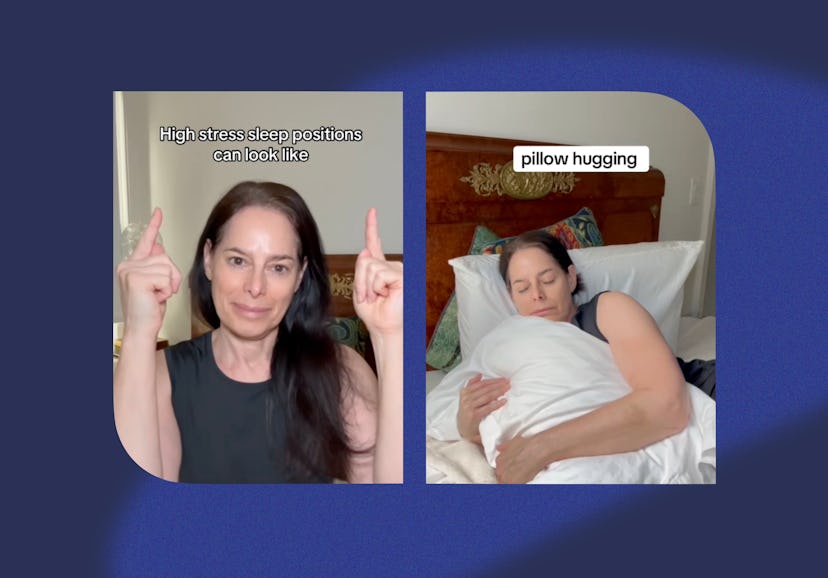It’s 11 p.m. and you’re climbing into bed. Do you cozy in on your side and gently drift off to sleep? Or sprawl out on your stomach with one knee crunched up by your chest? If you said the latter, it could be a sign that you’re dealing with major stress.
In a viral TikTok, creator @laurel_gut_health_doc shared the four “high stress” sleep positions that she says can point to high levels of tension. If you sleep in one of these poses, or cycle through them throughout the night, it could be a sign you aren’t healthily coping with stress, and it’s showing up in how you snooze.
The four poses include sleeping like a mummy with your arms clutched in tight, lying on your stomach with one leg up, grabbing a pillow for dear life, and curling into the fetal position. If any of these sound familiar, your nervous system might be stuck in survival mode. “These positions can be signs of chronic stress, high cortisol, or a dysregulated body,” Laurel wrote in her caption.
In her comments, someone said, “Bro just showed all my favorite sleep positions.” Another wrote, “At this point, I am cortisol itself.” Others wanted to know what to do about it. Here, sleep experts break down each “high stress” position and share tips for relieving anxiety so you can snooze with ease.
Are These Sleep Positions A Sign Of Stress?
According to Dr. Debra Kissen, a licensed clinical psychologist and CEO and founder of Light On Anxiety CBT Treatment Center, there is a connection between your body and brain when it comes to having a stress response, and it could certainly show up in how you sleep.
If your thoughts are racing with worry — maybe you’re thinking about an upcoming meeting or replaying everything you said on an awkward date — your body might kick into fight-or-flight and activate your sympathetic nervous system or stress response.
That, in turn, might cause you to default to “protective” sleep positions, such as the fetal position or the mummy position, as a way to feel safe. The reverse is also true, Kissen tells Bustle. “When you curl up tightly, cross your arms, or tense muscles as if you’re guarding [yourself], you send a message to your brain that you’re under threat,” she says. “That’s why more ‘closed off’ sleep positions can sometimes mirror a high-stress state.”
The Mummy
Do you often find yourself lying on your back with your arms clenched over your chest? If so, it could be a sign that you’re locked in or on guard due to all that pesky daytime stress. According to Kissen, it’s because this pose mimics a state of bracing. “Crossing arms can signal hyper-vigilance,” she says, almost like you’re waiting for something bad to happen.
On Your Stomach
Are you a bona fide stomach sleeper? While it might just be a natural pose that feels most comfortable, it’s also a go-to for anyone who’s feeling anxious. “Pressing into the mattress can feel grounding, like anchoring yourself when the world feels chaotic,” Kissen says. It can also feel good to lie as flat as possible, especially when you’re overwhelmed.
Fetal Position
While these sleep positions aren’t a guaranteed sign of stress, you might want to make a few changes if you constantly curl into a tight ball at night. “This is one of the most protective postures — curled up, covering the front of the body, and guarding vital organs,” she says. “It’s a classic ‘safety mode’ position when you’re under stress.”
Pillow Hugging
While some people just like the support, take note if you immediately grip onto your pillow once you climb into bed. “Clutching onto something can be soothing,” Kissen says. “It could be a way of creating stability when you feel emotionally unsettled.”
How To Relieve Stressful Sleep
According to Dr. Jade Wu, a board-certified sleep psychologist and Mattress Firm Sleep Advisor, you can manage stress throughout the day with exercise, mindfulness practices, and social connection. Think long walks, meditation, and meeting up with friends to vent after work. When you add more of these habits to your day, it can lead to better, longer, more restful sleep at night.
While it’s impossible to fully rid yourself of stress overnight, you can also do things right before bed that could help, especially if you have a particularly overwhelming day. “Leading up to bedtime, try activities that allow you to 'get out of your head and into your body,'“ she says, such as stretching or taking a nice bath. That should help you settle in. As a bonus, a soothing sleep story could also keep your mind off your woes.
Even if your body wants to curl into a high-stress position, Kissen recommends taking a deep breath, stretching out, and preferably ending up on your side — one of the healthiest sleep positions to be in.
“When you allow yourself to rest in a more open, expansive position, you’re sending the brain a message of safety: ‘There’s nothing I need to protect myself from,’” she says. “This is why sleep posture matters.”
Source:
Dr. Debra Kissen, licensed clinical psychologist, CEO, founder of Light On Anxiety CBT Treatment Center
Dr. Jade Wu, board-certified sleep psychologist, Mattress Firm Sleep Advisor
